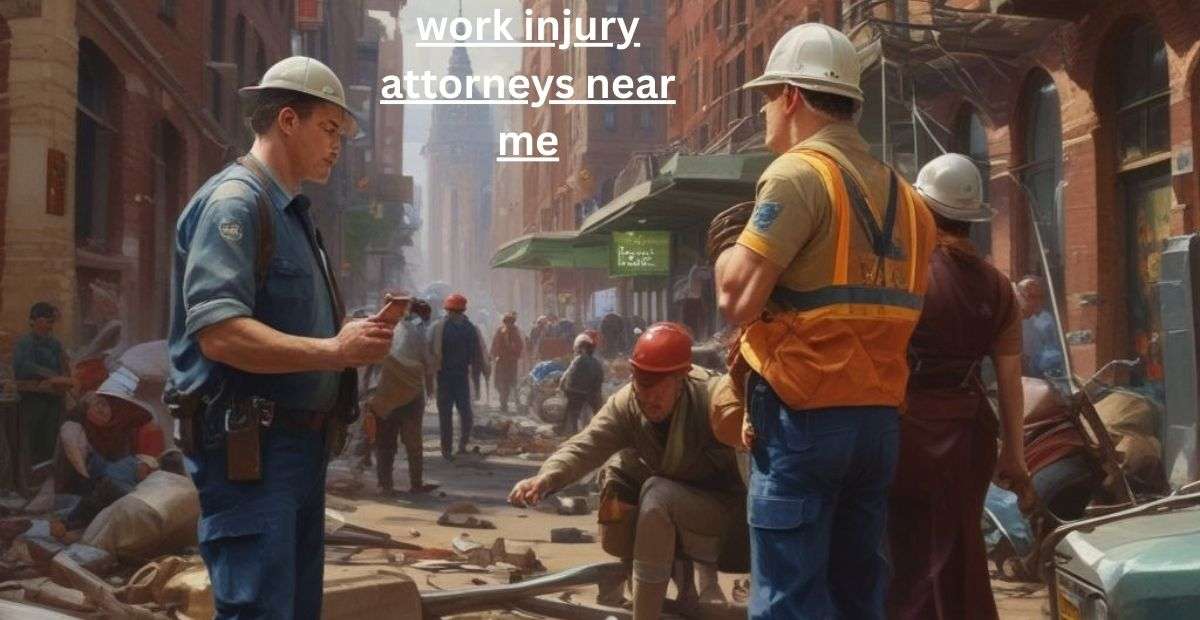Contents
Work Injury Attorneys Near Me

Work injury attorneys play a crucial role in helping employees secure fair compensation after workplace accidents. Whether you suffer from a slip and fall, machinery malfunction, or repetitive stress injury, navigating the legal process alone can be overwhelming. Many workers face challenges such as claim denials, delayed payments, or disputes with employers and insurance companies. This is where an experienced work injury attorney can make a significant difference.
They not only guide you through workers’ compensation claims but also fight for additional benefits if your injury involves negligence or third-party liability. In this comprehensive guide, we will explore why hiring a skilled work injury attorney is essential, how to find the best legal representation near you, and the key steps in maximizing your compensation. Whether you’re dealing with a minor injury or a life-altering accident, understanding your rights and the legal process is the first step toward financial and medical recovery. Keep reading to learn everything you need to know about work injury attorneys and how they can help protect your future.
Introduction to Work Injury Attorneys
Who Are Work Injury Attorneys?
Work injury attorneys specialize in legal cases where employees get injured on the job. They help injured workers obtain compensation and legal protection.
Why Work Injury Cases Require Legal Help
Many work injury claims are denied due to technicalities, lack of evidence, or employer disputes. An attorney ensures workers get the compensation they deserve.
When Should You Contact a Work Injury Attorney?
- If your employer denies your injury claim
- If your compensation is lower than expected
- If you face retaliation for filing a claim
- If your injury requires long-term medical care
Why You Need a Work Injury Attorney
The Complexities of Work Injury Claims
Workers’ compensation laws are complex and vary by state. An attorney simplifies the legal process.
Protecting Your Rights Against Employers and Insurers
Employers and insurance companies often try to minimize payouts. An attorney fights for your rights.
Ensuring Maximum Compensation for Medical Bills and Lost Wages
Attorneys help secure fair compensation for medical expenses, lost income, and rehabilitation costs.
How to Find the Best Work Injury Attorneys Near Me
Using Online Directories and Lawyer Listings
Websites like Avvo, Martindale-Hubbell, and Google Reviews help locate reputable attorneys.
Checking Client Reviews and Testimonials
Reading real client experiences gives insights into an attorney’s success rate and professionalism.
Asking for Referrals from Colleagues and Friends
Personal recommendations from coworkers, friends, or union representatives can help find trusted legal professionals.
Consulting Local Bar Associations
State and local bar associations list licensed attorneys who specialize in work injury cases.
Key Qualities of Top Work Injury Attorneys
Experience in Handling Work Injury Cases
Attorneys with extensive experience in workplace injury law can navigate complex legal systems more effectively.
Successful Track Record and Case Wins
A strong success rate indicates that the attorney has won similar cases and obtained fair settlements for clients.
Strong Negotiation and Litigation Skills
A skilled attorney can negotiate better settlements or take the case to trial if necessary.
Clear Communication and Client Focus
Good attorneys explain legal processes clearly and prioritize their clients’ best interests.
Common Work Injury Cases Handled by Attorneys
Slip and Fall Accidents
These happen due to wet floors, uneven surfaces, or poor workplace safety standards.
Repetitive Stress Injuries
Prolonged repetitive motions can lead to conditions like carpal tunnel syndrome or tendonitis.
Machinery and Equipment Malfunctions
Faulty or unsafe machinery can cause severe injuries, leading to claims against employers or manufacturers.
Construction Site Accidents
Falls from heights, scaffold collapses, and heavy equipment accidents are common in construction work.
Toxic Exposure and Workplace Illnesses
Workers exposed to harmful chemicals or unsafe environments may develop serious health conditions.
Understanding Workers’ Compensation and Legal Rights

What Is Workers’ Compensation?
Workers’ compensation is an insurance program that provides benefits to employees injured at work.
What Does Workers’ Compensation Cover?
- Medical expenses
- Lost wages
- Rehabilitation costs
- Permanent disability benefits
When Can You Sue Outside of Workers’ Compensation?
- If your employer acted negligently
- If a third party (e.g., equipment manufacturer) caused your injury
- If your claim was wrongfully denied
Steps to Take After a Work Injury
Seek Immediate Medical Attention
A doctor’s report is essential for both your health and your legal claim.
Report the Injury to Your Employer
Informing your employer as soon as possible prevents claim denials.
Gather Evidence and Witness Statements
Photos, videos, and witness testimonies strengthen your case.
File a Workers’ Compensation Claim
Filing correctly and within deadlines prevents delays in benefits.
How Attorneys Can Help Maximize Compensation
Negotiating with Insurance Companies
Insurance adjusters often offer low settlements. Attorneys negotiate for higher payouts.
Proving Liability and Employer Negligence
A lawyer collects evidence to prove employer fault in unsafe working conditions.
Filing Additional Claims for Full Compensation
Attorneys may file lawsuits for pain, suffering, or third-party negligence if applicable.
What to Expect in a Work Injury Claim Process
Filing the Initial Claim
The process begins with submitting a formal claim to the employer or insurer.
Investigation and Medical Evaluation
Your injury will be assessed, and insurance companies will investigate the claim.
Settlement Negotiations or Trial Proceedings
If a fair settlement isn’t reached, attorneys take the case to court.
Costs and Fees for Work Injury Attorneys
Contingency Fees vs. Hourly Rates
Most attorneys work on a contingency basis, meaning they only get paid if you win.
Percentage of Settlement Fees
Attorneys typically take 25% to 40% of your final compensation as their fee.
Additional Legal Costs
Filing fees, expert witness fees, and administrative costs may apply.
How to Choose the Right Attorney for Your Case
Verifying Credentials and Licenses
Ensure the attorney is certified and licensed in your state.
Assessing Experience in Similar Cases
Check the lawyer’s past cases and success rate in work injury claims.
Scheduling a Free Consultation
Most work injury attorneys offer free consultations to discuss your case.
Questions to Ask Work Injury Attorneys Near Me
What Experience Do You Have in Work Injury Cases?
Look for attorneys with a strong history of winning cases similar to yours.
What Are Your Fees and Payment Structure?
Understanding costs upfront prevents surprises later.
How Long Will My Case Take?
Timeframes vary, so discuss potential delays and expected resolutions.
Success Stories of Work Injury Cases
Examples of High-Value Settlements
Case studies highlight attorneys who won substantial settlements for their clients.
How Legal Representation Made a Difference
Stories of employees who secured fair compensation with legal help.
Avoiding Common Mistakes in Work Injury Claims
Failing to Report the Injury Immediately
Delays in reporting can lead to claim denials.
Accepting a Low Settlement Offer Too Quickly
Insurance companies may offer low settlements to close cases quickly.
Not Hiring an Attorney Early
Without legal help, workers may miss out on full compensation.
The Role of Insurance in Work Injury Cases
How Insurance Companies Handle Work Injury Claims
Insurance providers assess claims and decide payouts.
Tactics Insurers Use to Minimize Payouts
They may dispute injuries, delay claims, or offer lower settlements.
How Attorneys Challenge Insurance Companies
Legal experts fight against unfair claim denials and undervalued settlements.
FAQs About Work Injury Attorneys
Do I Need a Lawyer If My Employer Accepts My Claim?
Even if accepted, an attorney ensures you get the full benefits you deserve.
What Happens If My Claim Is Denied?
A lawyer can file an appeal and present evidence to reverse the decision.
Can I Sue My Employer for a Work Injury?
Laws vary, but lawsuits may be possible in cases of employer negligence.
How much do most injury lawyers charge?
Most work injury attorneys charge a contingency fee, typically 25% to 40% of the final settlement or award. This means you pay only if they win your case.
How much do workplace injuries cost the US?
Workplace injuries cost the U.S. over $167 billion annually, including medical expenses, lost wages, and administrative costs related to workers’ compensation claims.
What injuries pay the most?
Severe injuries like traumatic brain injuries (TBI), spinal cord damage, amputations, and severe burns tend to result in the highest workers’ compensation payouts.
What is the maximum amount for workers’ compensation?
The maximum amount varies by state but can range from $800 to $1,800 per week, depending on your pre-injury wages and local workers’ compensation laws.
What is maximum recovery in workers’ compensation?
The maximum recovery depends on factors like injury severity and duration. Some states impose caps, while others allow lifelong benefits for permanent disabilities.
What is the highest paid workers’ comp settlement?
One of the highest workers’ comp settlements exceeded $10 million, often seen in catastrophic cases involving permanent disability or life-altering injuries.
What is the maximum amount for workers’ compensation?
Workers’ compensation benefits are typically capped by state law, with some jurisdictions providing lifetime medical care and wage replacement for severe injuries.
Conclusion: Finding the Best Work Injury Attorney
Why Legal Representation Is Essential
A skilled attorney increases your chances of winning fair compensation.
Steps to Take Today
Start by researching attorneys, scheduling consultations, and gathering evidence for your claim.

